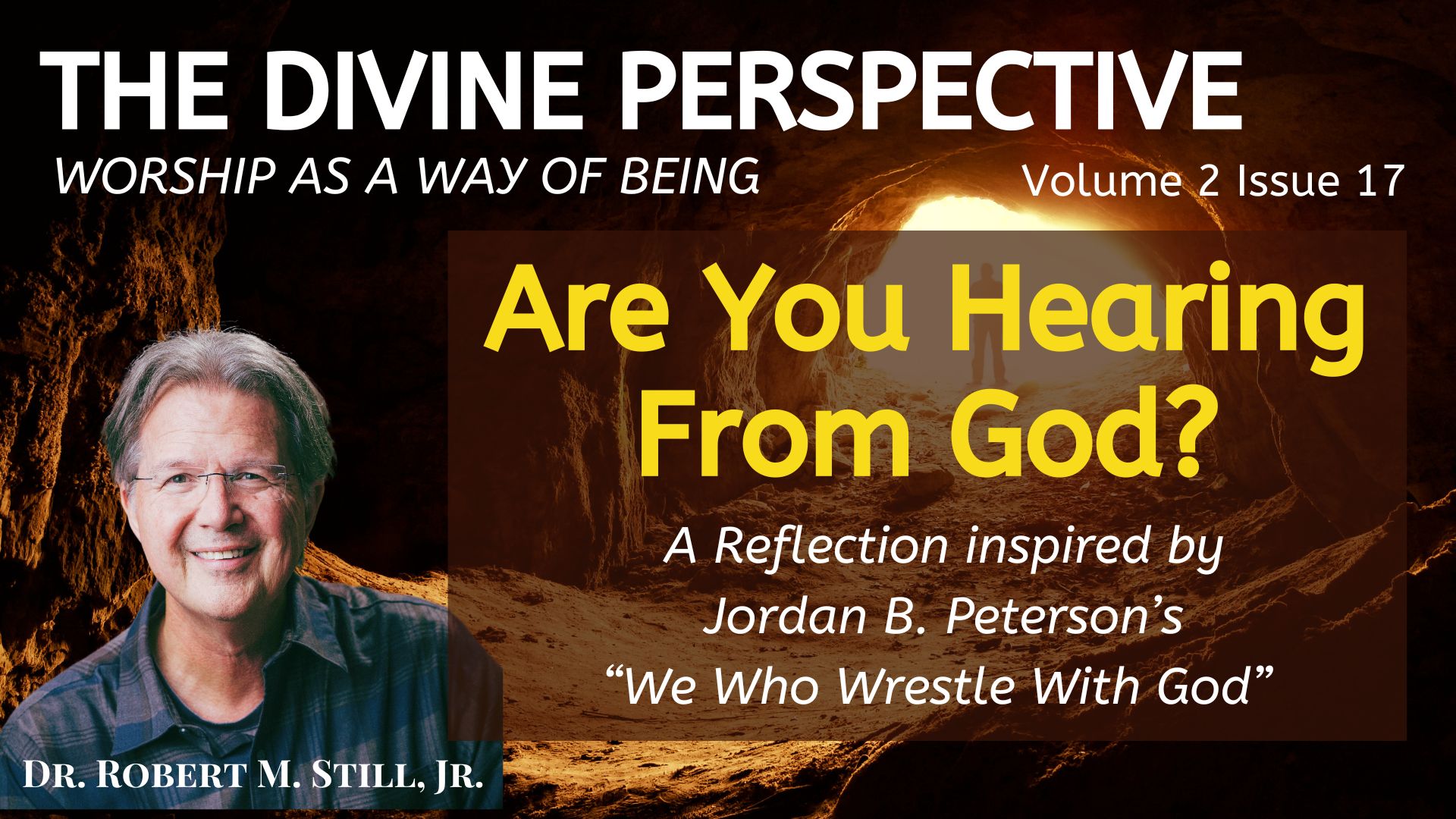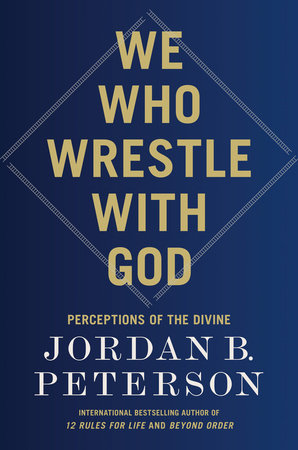Are You Hearing From God?

“Be still and know that I am God; I will be exalted among the nations, I will be exalted in the Earth.” Psalm 46:10
Do you struggle with hearing God’s voice?
I know I often do. Discerning God’s direction can feel elusive.
The theme of hearing God’s voice is the opening motif of Jordan Peterson’s new book, We Who Wrestle With God. Peterson introduces his 544 page epic tome with an in-depth reflection on the meaning of Elijah’s encounter with the “still small voice” in 1 Kings 19.
In a world of noise and distraction, how can we hear God today?
As the season of Advent approaches, it offers an opportunity to focus more deeply on God. Advent invites us to slow down, connect with God's story, and listen for His voice.
In Peterson's exploration of Elijah, we find a profound illustration of how God speaks—not through chaos and noise, but through stillness and intimacy. Intimacy with God is what our souls long for.
Wrestling With God in the Story of Elijah
Elijah’s story is one of victory and despair. 1 Kings 18 recounts how Elijah triumphed over the false prophets of Baal in a dramatic and deadly religious power encounter on Mount Carmel. Fire fell from heaven, over 450 Baal priests were slain, and all the people of Israel recognized God’s power. God vindicated and elevated Elijah with a tremendous victory spiritually and physically.
But the backlash of retaliation was crushing. Wicked king Ahab and despicable queen Jezebel make a vow to have Elijah killed (1 King 19:2). The man of God flees into the wilderness and hides in a cave—exhausted, depressed, and despondent. In this place of utter brokenness, a distraught Elijah cries out for the Lord to take his life (1 Kings 19:4).
But God’s response is unexpected and illuminating. He demonstrates His might by a powerful wind, a tumultuous earthquake, and a fierce fire—but His presence is not in any of these. Instead, God reveals Himself in a “gentle whisper”—a still, small voice. (1 Kings 19:11-13)
Peterson calls this moment as “a discovery of unparalleled magnitude.” God’s voice is not loud or forceful; on the contrary, it is subtle and quiet, requiring attentiveness and stillness to hear.
Listening for God in the Stillness
Psalm 46:10 echoes this truth: “Be still and know that I am God.”
Peterson suggests that the ability to hear God is found within—manifesting as conscience, the internal guide to what is right and wrong, the autonomous spirit dwelling in each of us. By “attending to conscience,” he argues, we can establish a relationship with God. [1]
Peterson notes that:
the receipt of revelation in a solitary place is a common storytelling trope. Internal voices and imaginative experiences become more likely under conditions of isolation, where external sensory stimuli are dramatically reduced. This increases the likelihood of revelatory experience – for better or worse.
Elijah’s story reminds us that hearing God requires us to slow down, be still and pay attention. It also challenges us to contend with the disappointments, distractions, and fears that can impair our spiritual ears.
What noise is keeping you from hearing God’s voice? What steps could you take to quiet the distractions of your inner life?
Wrestling with God in Every Decision
In We Who Wrestle With God, Peterson describes life as a constant process of prioritization—every decision we make moves us toward one destination and away from others.
Our lives are constructed from an ongoing series of decisions informed by the values we embody and derived from the story we believe we are living.
Peterson defines story as “a description of the structure through which we see the world.” I would call that a worldview. A Christian worldview sees the Bible as the grand meta-narrative shaping all of history.
Peterson describes the Bible as “the library of stories” upon which “Western civilization is predicated.” These stories offer a “collection of characterizations not only of God . . . but [also] of man and woman.”
I see these biblical characterizations as descriptors of identity. Men and women are created imago Dei, in the very image of God. Much of the tension in our world comes from distorted views of God’s identity and our own. When we align ourselves with the truth of our identity in God, we find clarity and purpose.
A Call to Worship
Peterson describes the imitation of God, the worship of God, and the embodiment of being like God (i.e., pursuing holiness) as 'the highest of all possible aims.'
He explains that men and women are 'held to exist in relationship' with God and society. The Bible reveals that 'sacrifice makes such aim possible,' and the ultimate goal of our existence—the 'transcendent target'—is to 'unite all things in the best possible manner.'
To sum it up from my perspective: we are here to be stewards of God's creation, ambassadors for Christ, and, simply put, to make the world a better place.
God’s word shows us how to pursue the best, showing us “the eternal path forward up the holy mountain to the heavenly city” yet also “warning of the apocalyptic dangers” of the unholy, deviant, and demonic. God is “the spirit that leads up.” Yet, as humans, we struggle with God’s spirit “in every decision.”
In Peterson’s words, “At every moment of consciousness, we are fated to wrestle with God.”
This wrestling is not always easy. It requires sacrifice—giving up one possibility to pursue another. But it’s also how we grow spiritually and relationally, and thus fulfill our destiny in God.
Every choice we make is an act of worship, revealing the direction of our hearts. The question is: where is our worship directed? Toward God, or toward lesser things?
Advent: A Time To Listen
As I write this, Thanksgiving and Advent are approaching, inviting us to reflect on these questions. Advent is a season of waiting—waiting for Christ’s arrival, waiting for God to move. That is Incarnation. It’s a time to remember that God is not silent. He speaks to us through His Word, through His Spirit, and yes, through the 'still small voice' that stirs in our hearts.
And that is today’s Divine Perspective!
PRAYER:
Father, give us ears to hear Your voice today. In the stillness, let us discern Your will and align our lives with Your purposes. Shape our decisions to reflect Your character and walk in step with Your Spirit. In the name of the Father, Son, and Holy Spirit, Amen.
STAY CONNECTED: Sign up for The Divine Perspective, my newsletter that synergizes spirituality, theology, creativity, and personal development from an artist and academic who envisions worship as a way of being.
Thank you for subscribing!
Have a great day!
Rob Still Ministries, Inc is a TN Non-profit corporation and 501(c)(3) charity organized exclusively for charitable, religious, and educational purposes, including, the making of distributions to organizations that qualify as exempt organizations under section 501(c)(3) of the Internal Revenue Code (USA). Donations are tax-deductible for income tax purposes to the extent allowed by law.

